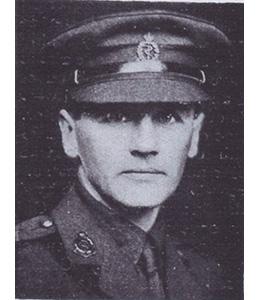Died of wounds received in action aged 41
Buried in Etretat Churchyard Extension Plot II. C. 9
Charles Edgar Andrew was born in Hammersmith, the elder son of the Rev. Alfred Wilson, Vicar of Bedford Park, Chiswick, London and his wife Fanny, who was born in Mauritius.
Educated at Ashtead, Surrey, and Charterhouse from 1891, he came up to Christ Church in 1895, and gained a Final First Class Honours in Physiology. He joined St. Thomas’s Hospital, London in 1909, graduated in 1902, and held house appointments at the General Hospital in Birmingham and at Great Ormond Street Hospital, before taking up practice in Petworth.
On 23 April 1908, he married Mary Barnes Mein in Newcastle upon Tyne. They lived at The North House, Petworth, Sussex, and on 27 February 1909 their only son Richard Nicholas was born.
Charles joined the RAMC in September 1916 as a Captain, serving in Flanders and France. He died on 8 April 1918 at No.1 General Hospital, Etretat of wounds received in action near St Quentin on 28 March.
Captain Wilson’s name is on the Charterhouse Roll of Honour and there is a Memorial Plaque to him in All Hallows Church at Tillington near Petworth.
“To the glorious memory of my dear husband Charles Edgar Andrew Wilson B.A. M.B. BCh. Oxon who in 1916 gave up his practice in this neighbourhood to volunteer for active service and as Temp. Capt R.A.M.C. attd 9th Rifle Brigade died on April 8th 1918 from wounds received near St. Quentin on March 28th aged 41. He lies in a soldier’s grave at Etretat, France.
One who never turned his back but marched breast forwards.
Never doubted clouds would break. Never dreamed though
right were worsted wrong would triumph.
Held we fall to rise. Are baffled to fight better. Sleep to Wake”
The Colonel of the Northumberland Fusiliers to which he was attached wrote “He was loved and admired by us all and I know that, personally, I have lost a great friend, one of the kindest and most sympathetic men I have known.” The Colonel of the Rifle Brigade wrote “He is a great loss to us all, the best doctor we ever had; we all loved him.”
He was recommended for the Military Cross for conspicuous courage and bravery under heavy fire.
Probate was granted to his wife and the Public Trustee on 7 August 1918. He left £8,450-14s-3d.


